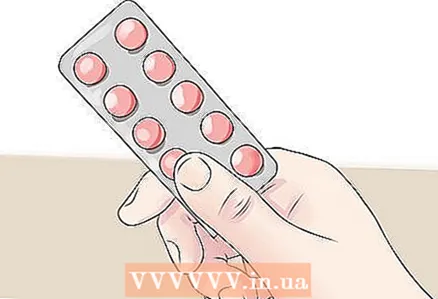
Content
- Steps
- Part 1 of 3: Change your lifestyle
- Part 2 of 3: Eye Exercises
- Part 3 of 3: Treating Macular Degeneration
- Tips
Macular degeneration, or macular dystrophy, is a common eye condition that causes decreased central vision. With macular degeneration, you may have difficulty focusing on an object, and in some cases, your vision may be completely lost.There are two types of macular degeneration, and 80% to 90% of cases are dry macular degeneration, in which white or yellow spots appear on the eyes, causing vision loss over time. Wet macular degeneration develops when there is a pathology in the blood vessels of the eyes, which causes bleeding and leakage of fluid, but this type of macular degeneration is much less common. This type of macular degeneration leads to rapid vision loss. Methods for the prevention of macular degeneration are the same in both cases, only the methods of surgical treatment of the disease differ.
Steps
Part 1 of 3: Change your lifestyle
 1 Check your eyesight. If you notice any vision problems, be sure to consult an optometrist. When visiting a doctor, be sure to inform if there are factors that increase the risk of developing this disease. Talk with your doctor about how to reduce the impact of these risk factors. The doctor will be able to identify visual impairment, if any, and prevent vision loss. 11% of people aged 65 to 74 have macular degeneration, while among people over 75 years old, this disease is almost three times more common (27.9%). The following factors increase your risk of developing macular degeneration:
1 Check your eyesight. If you notice any vision problems, be sure to consult an optometrist. When visiting a doctor, be sure to inform if there are factors that increase the risk of developing this disease. Talk with your doctor about how to reduce the impact of these risk factors. The doctor will be able to identify visual impairment, if any, and prevent vision loss. 11% of people aged 65 to 74 have macular degeneration, while among people over 75 years old, this disease is almost three times more common (27.9%). The following factors increase your risk of developing macular degeneration: - obesity;
- belonging to a certain ethnic group;
- smoking;
- respiratory chlamydia infections (chlamydia pneumoniae);
- macular degeneration in relatives;
- light eye color, that is, the iris of the eye is blue or green;
- cardiovascular diseases.
 2 Stop smoking. When smoked, the retina is exposed to toxins from the tobacco. Smoking cigarettes increases the risk of macular degeneration by two to five times. The blood vessels of the eyes are the thinnest in the body. Toxins from cigarettes are deposited in the body and damage these vessels more easily.
2 Stop smoking. When smoked, the retina is exposed to toxins from the tobacco. Smoking cigarettes increases the risk of macular degeneration by two to five times. The blood vessels of the eyes are the thinnest in the body. Toxins from cigarettes are deposited in the body and damage these vessels more easily. - Smoking also breaks down lutein, which is important for eye health and retinal protection.
 3 Protect your eyes from the sun. It is believed that excessive exposure to ultraviolet rays can contribute to the development of macular degeneration. UV rays emit radiation on both sunny and cloudy days. It is important to protect your eyes when you are outside. Wear goggles that protect your eyes from UV-A and UV-B rays. You should also wear a hat for extra protection.
3 Protect your eyes from the sun. It is believed that excessive exposure to ultraviolet rays can contribute to the development of macular degeneration. UV rays emit radiation on both sunny and cloudy days. It is important to protect your eyes when you are outside. Wear goggles that protect your eyes from UV-A and UV-B rays. You should also wear a hat for extra protection. - Polarized glasses help protect your eyes from even more hazardous rays. On the market, you can find sunglasses with sun protection on the side and top - they block even more sun rays.
 4 Eat healthy foods to prevent obesity. Obesity is one of the main risk factors contributing to the development of macular degeneration. And although scientists have still not been able to explain this connection, it is recommended to maintain a healthy weight, monitor blood pressure and cholesterol levels. Eat small meals and try to choose lean and protein foods, such as eating more fruits, vegetables, turkey, and whole grains. In addition, you should limit your intake of high-calorie foods and saturated fats. Limit or avoid the following foods:
4 Eat healthy foods to prevent obesity. Obesity is one of the main risk factors contributing to the development of macular degeneration. And although scientists have still not been able to explain this connection, it is recommended to maintain a healthy weight, monitor blood pressure and cholesterol levels. Eat small meals and try to choose lean and protein foods, such as eating more fruits, vegetables, turkey, and whole grains. In addition, you should limit your intake of high-calorie foods and saturated fats. Limit or avoid the following foods: - animal fats;
- vegetables;
- nuts and seeds, peanut butter;
- salad dressings;
- fast food;
- dark chocolate;
- cheese;
- fatty foods or processed meat foods.
 5 Eat foods rich in vitamin C. Vitamin C is one of the strongest vitamins for improving vision. It is also an antioxidant, which means it helps fight damage to the eyes due to oxidative stress. You can take a dietary supplement of 500 mg of vitamin C daily or eat more, at least half a cup, of foods rich in vitamin C. Foods high in vitamin C:
5 Eat foods rich in vitamin C. Vitamin C is one of the strongest vitamins for improving vision. It is also an antioxidant, which means it helps fight damage to the eyes due to oxidative stress. You can take a dietary supplement of 500 mg of vitamin C daily or eat more, at least half a cup, of foods rich in vitamin C. Foods high in vitamin C: - grapefruit;
- Strawberry;
- papaya;
- Brussels sprouts;
- oranges;
- Green pepper.
 6 Eat more vitamin B-rich foods. Vitamin B contributes to improved eye health, especially when combined with folic acid.This combination reduces the risk of age-related macular degeneration of the eyes. Vitamin B can be taken as a dietary supplement or include the following foods in your diet:
6 Eat more vitamin B-rich foods. Vitamin B contributes to improved eye health, especially when combined with folic acid.This combination reduces the risk of age-related macular degeneration of the eyes. Vitamin B can be taken as a dietary supplement or include the following foods in your diet: - fish;
- bread;
- oatmeal;
- eggs;
- milk;
- cheese;
- rice;
- peas (rich in folic acid);
- Asparagus (rich in folic acid)
- brown rice (rich in folic acid);
- folic acid-fortified cereals.
 7 Include vitamins A and E in your diet. These vitamins work in the same way as vitamin C in protecting and strengthening the eyes. To get enough vitamin A, take 15 mg of beta-carotene every day and up to 25,000 CFU of vitamin A in your supplement. Take a 400 CFU vitamin E supplement. However, these vitamins can also be obtained from conventional food. Good sources of these vitamins are:
7 Include vitamins A and E in your diet. These vitamins work in the same way as vitamin C in protecting and strengthening the eyes. To get enough vitamin A, take 15 mg of beta-carotene every day and up to 25,000 CFU of vitamin A in your supplement. Take a 400 CFU vitamin E supplement. However, these vitamins can also be obtained from conventional food. Good sources of these vitamins are: - Vitamin A: Sweet potato, carrot, kale, pumpkin, romano salad, dried apricots, bell peppers, tuna and mango.
- Vitamin E: Sunflower seeds, almonds, spinach, Swiss chard, avocado, asparagus, mustard, and shrimp.
 8 Consume more zinc and other minerals. Research has shown that zinc is essential for eye health. The eyes contain a lot of zinc as zinc increases the production of enzymes for the eyes. Zinc can be used as a dietary supplement, but it is found naturally in a variety of foods. If you choose to take it as a dietary supplement, take 80 mg of zinc oxide and 2 mg of copper (copper oxide) every day. Zinc is found in the following foods:
8 Consume more zinc and other minerals. Research has shown that zinc is essential for eye health. The eyes contain a lot of zinc as zinc increases the production of enzymes for the eyes. Zinc can be used as a dietary supplement, but it is found naturally in a variety of foods. If you choose to take it as a dietary supplement, take 80 mg of zinc oxide and 2 mg of copper (copper oxide) every day. Zinc is found in the following foods: - seafood (shellfish, oysters, crabs and lobsters);
- beef;
- pork;
- yogurt.
 9 Eat foods rich in lutein and zeaxanthin. These two antioxidants strengthen the pupil and the retina, which absorbs light that can cause macular degeneration. The two foods with the highest amounts of lutein and zeaxanthin are spinach and kale. Eat approximately 300 grams of spinach and kale per week to reduce your risk of macular degeneration.
9 Eat foods rich in lutein and zeaxanthin. These two antioxidants strengthen the pupil and the retina, which absorbs light that can cause macular degeneration. The two foods with the highest amounts of lutein and zeaxanthin are spinach and kale. Eat approximately 300 grams of spinach and kale per week to reduce your risk of macular degeneration. - If your diet is varied and nutrient-dense, you don't need to take additional nutritional supplements. But if you do not like or cannot eat enough dark green leafy vegetables, then take a dietary supplement with lutein and zeaxanthin for eye health.
 10 Add omega-3s to your diet. Omega-3 is an essential fatty acid that prevents eye inflammation and maintains cell health. If you are deficient in omega-3s, your vision may be impaired. While it is possible to take an omega-3 supplement, it is recommended that you get these fatty acids from food. Many omega-3s are found in foods such as:
10 Add omega-3s to your diet. Omega-3 is an essential fatty acid that prevents eye inflammation and maintains cell health. If you are deficient in omega-3s, your vision may be impaired. While it is possible to take an omega-3 supplement, it is recommended that you get these fatty acids from food. Many omega-3s are found in foods such as: - salmon, tuna, mackerel, anchovies, escalopes, sea bass, trout and halibut.
Part 2 of 3: Eye Exercises
 1 Blink more often. Forgetting to blink is very easy when you are concentrating on something in front of you, like watching your favorite TV show or working on something important on your computer. Remind yourself to blink more often. This will help you focus better and release tension.
1 Blink more often. Forgetting to blink is very easy when you are concentrating on something in front of you, like watching your favorite TV show or working on something important on your computer. Remind yourself to blink more often. This will help you focus better and release tension. - Try to blink every three to four seconds for two minutes. Or practice the 20-6-20 method: every 20 minutes, take your eyes off the screen and look at an object 6 meters away from you for about 20 seconds. It can be helpful to set an alarm or reminder.
 2 Cover your eyes with your palms. Sometimes the eyes need rest. Simply place the palms of your hands over your eyes with your fingers on your forehead and the bases of your palms on your cheeks. Relax and don't press too hard on your eyes.
2 Cover your eyes with your palms. Sometimes the eyes need rest. Simply place the palms of your hands over your eyes with your fingers on your forehead and the bases of your palms on your cheeks. Relax and don't press too hard on your eyes. - Placing the palms of your hands over your eyes, even for a few minutes, helps relieve tension and blink calmly, since this eliminates the need to focus on something in front of you. Eye strain leads to a host of other problems, including tension and headaches. Listen to your body and rest your eyes.
 3 Track eights with your eyes. Imagine you are looking at a large number 8."Draw" this shape with your eyes several times - these exercises help to strengthen the eye muscles, increase flexibility and allow you to take a break from focusing on anything. Repeat the exercise at least 5 times. You can also imagine a figure eight turned to one side (infinity sign) and "draw" it. Do the exercise for a few minutes.
3 Track eights with your eyes. Imagine you are looking at a large number 8."Draw" this shape with your eyes several times - these exercises help to strengthen the eye muscles, increase flexibility and allow you to take a break from focusing on anything. Repeat the exercise at least 5 times. You can also imagine a figure eight turned to one side (infinity sign) and "draw" it. Do the exercise for a few minutes. - The movement of the eyes, like any other part of the body, is controlled by muscles. Be sure to train your muscles and use them effectively, while allowing time to recover from tension or fatigue.
 4 Focus on objects near and far. Sit comfortably to start. Place your thumb in front of you, about 25 cm from your eyes. Focus on it for five minutes, then move your gaze to an object about 6 meters away. Hold your attention for about five seconds and repeat this process.
4 Focus on objects near and far. Sit comfortably to start. Place your thumb in front of you, about 25 cm from your eyes. Focus on it for five minutes, then move your gaze to an object about 6 meters away. Hold your attention for about five seconds and repeat this process. - Focusing on objects that are at different distances from you will help strengthen your vision.
 5 Try the zoom exercise. Keep your thumb in front of you with your arm fully extended. Focus on it for a few seconds, and then slowly begin to bring your finger closer to your face until it is about 7-8 cm from your eyes. Follow your finger the entire time you move it. Then slowly extend your hand back, remembering to concentrate on your finger.
5 Try the zoom exercise. Keep your thumb in front of you with your arm fully extended. Focus on it for a few seconds, and then slowly begin to bring your finger closer to your face until it is about 7-8 cm from your eyes. Follow your finger the entire time you move it. Then slowly extend your hand back, remembering to concentrate on your finger. - This exercise is a good way to rest your eyes and train your eye muscles.
Part 3 of 3: Treating Macular Degeneration
 1 Take high doses of vitamins. If you have moderate to severe dry macular degeneration, see your doctor to help you find the right treatment for you. Often, for the treatment of age-related macular degeneration, complexes containing high doses of vitamins are prescribed, which consist of 500 mg of vitamin C, 400 CFU of vitamin E, 15 mg of beta-carotene, 80 mg of zinc and 2 mg of copper - the effect of all these substances is aimed at strengthening vision. These drugs have not been shown to be effective in treating mild macular degeneration.
1 Take high doses of vitamins. If you have moderate to severe dry macular degeneration, see your doctor to help you find the right treatment for you. Often, for the treatment of age-related macular degeneration, complexes containing high doses of vitamins are prescribed, which consist of 500 mg of vitamin C, 400 CFU of vitamin E, 15 mg of beta-carotene, 80 mg of zinc and 2 mg of copper - the effect of all these substances is aimed at strengthening vision. These drugs have not been shown to be effective in treating mild macular degeneration. - If you have any questions or concerns about keeping your eyes healthy, be sure to ask your doctor. Be sure to inform if you smoke. Smoking is a risk factor for the development of macular degeneration, as well as many other diseases, including lung cancer.
 2 Take a course of injections. If you have wet macular degeneration, which causes abnormal growth of blood vessels in the eye, your doctor may prescribe bevacizumab, ranibizumab, pegaptanib, or aflibercept. When these drugs are taken, abnormal blood vessel growth and fluid leakage — which causes macular degeneration — are stopped. The doctor injects the prescribed drugs directly into the eyes.
2 Take a course of injections. If you have wet macular degeneration, which causes abnormal growth of blood vessels in the eye, your doctor may prescribe bevacizumab, ranibizumab, pegaptanib, or aflibercept. When these drugs are taken, abnormal blood vessel growth and fluid leakage — which causes macular degeneration — are stopped. The doctor injects the prescribed drugs directly into the eyes. - According to studies, 40% of patients have improved vision by at least three lines, while 95% of patients retained vision.
 3 Get surgery if you have wet maculidystrophy. If macular degeneration is caused by abnormal growth of blood vessels, then your doctor may recommend laser surgery (also called photocoagulation) or photodynamic therapy (PDT).
3 Get surgery if you have wet maculidystrophy. If macular degeneration is caused by abnormal growth of blood vessels, then your doctor may recommend laser surgery (also called photocoagulation) or photodynamic therapy (PDT). - Laser surgery: During this surgery, the affected areas of the blood vessels in the eyes are removed using a small beam of light.
- Photodynamic therapy (PDT): This therapy uses light to activate a drug that is injected into the eye. The drug destroys the affected blood vessels. During this procedure, there is a 4% risk of rapid and severe vision loss, while many patients report a significant reduction in visual impairment.
Tips
- To prevent obesity, which increases the risk of developing macular degeneration, it is important to exercise regularly. Try to devote at least 30 minutes a day to physical activity, several times a week.



